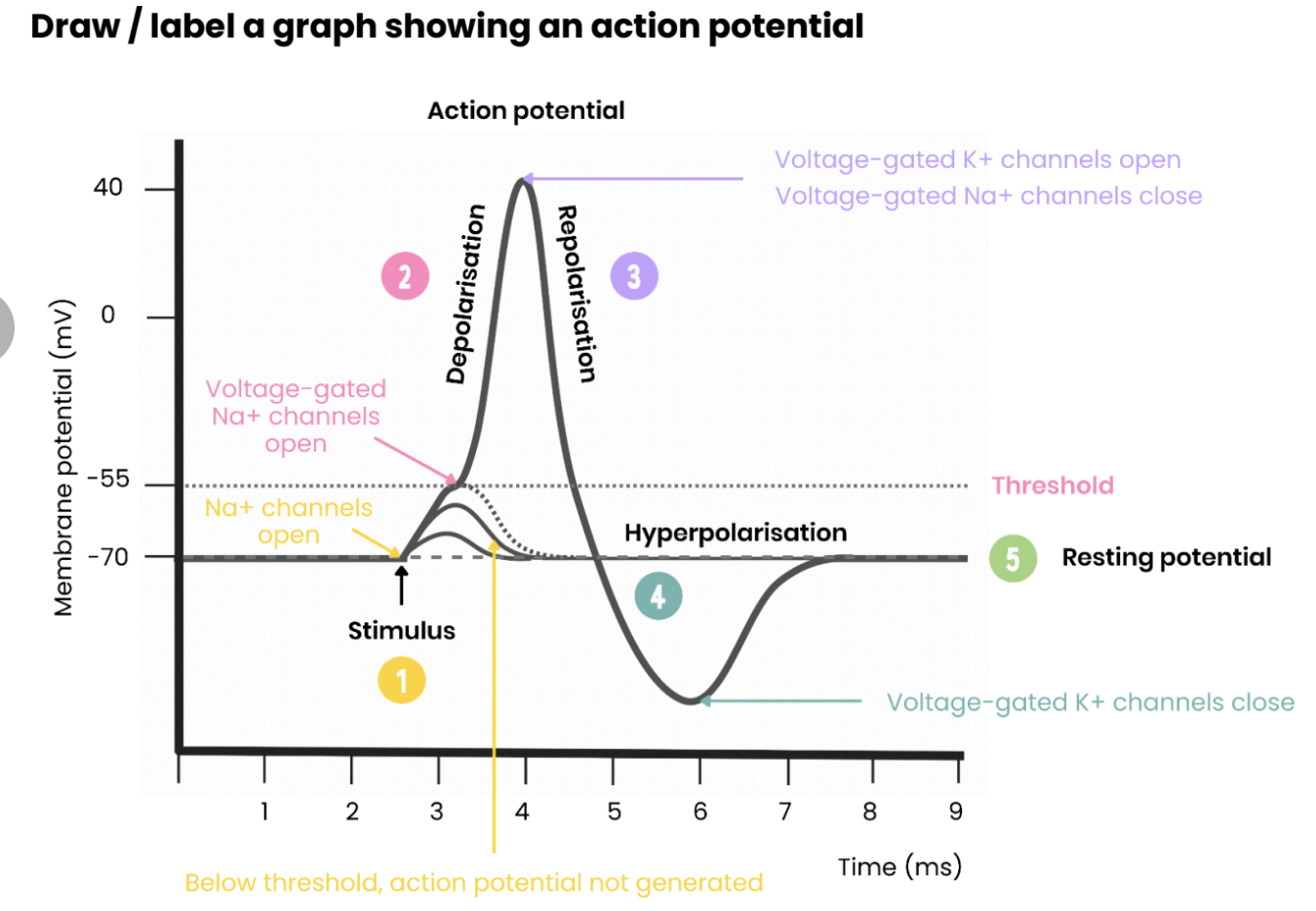Nerve Impulses
1/15
There's no tags or description
Looks like no tags are added yet.
Name | Mastery | Learn | Test | Matching | Spaced |
|---|
No study sessions yet.
16 Terms
What is the structure of a myelinated motor neurone?
Dendrite: carry nerve impulses towards cell body
Cell body: associated with production of proteins and neurotransmitters
Axon: carries nerve impulses away from cell body (contains myelin sheath and nodes of ranvier)
Myeline sheath: made of Schwann cells
Nodes of ranvier: constrictions between adjacent Schwann cells where there is no myelin sheath
What does resting potential mean?
When the inside of an axon has a negative charge relative to the outside of the axon (more positive ions outside compared to inside)
How is a resting potential established across the axon membrane in a neurone?
The sodium-potassium pump actively transports 3 sodium ions out of the axon and 2 potassium ions into the axon
This creates an electrochemical gradient, as there is a higher potassium ion conc inside the axon and higher sodium ion convert outside the axon
This creates different membrane permeabilities:
More permeable to potassium ions (move out by facilitated diffusion as potassium ion channels are open)
Less permeable to sodium ions (channels are closed)
How can changes in membrane permeability lead to depolarisation and the generation of an action potential?
STIMULUS
The sodium ion channels open, so membrane permeability to sodium ions increases
The sodium ions diffused into the axon down an electrochemical gradient, causing depolarisation
DEPOLARISATION
If threshold potential is reached, an action potential is generated
As more voltage- gated sodium ion channels open, more sodium ions diffuse in rapidly
What does threshold potential mean?
Minimum level of depolarising stimulation a neurone must receive in order for an action potential to be generated
What is an action potential?
A rapid, brief electrical impulse that travels down the axon of a neuron, enabling communication between neurons and other cells
What occurs during repolarisation?
The voltage gated sodium ion channels close
The voltage gated potassium ion channels open and potassium ions diffuse out of axon
What occurs during hyperpolarisation?
Potassium ion channels slow to close so there’s a slight overshoot, and too many potassium ions diffuse out of axon
Label a graph showing an action potential

What is the all-or-nothing principle?
For an action potential to be produced, depolarisation must exceed the threshold potential
Action potentials are always the same magnitude at the same potential, so a bigger stimuli is needed to increase the frequency of action potentials
How does the passage of an action potential along a non-myelinated axon result in nerve impulses?
The action potential passes as a wave of depolarisation
An influx of sodium ions in one region increases the permeability of adjoining region to sodium ions by causing voltage gated sodium ion channels to open, and adjoining region depolarises
How does the passage of an action potential along a myelinated axon result in nerve impulses?
Myelination provides electrical insulation
Depolarisation of axon at nodes of ranvier only
Results in saltatory conduction (rapid transmission of. impulse along myelinated axon, where impulse jumps from one node of ranvier to the next)
So there is no need for depolarisation along whole length of axon
How does damage to the myelin sheath lead to slow responses and/ or jerky movement?
Less/ no saltatory conduction, so depolarisation occurs along whole length of axon
Therefore nerve impulses take longer to reach neuromuscular junction, and there is a delay in muscle contraction
Ions/ depolarisation may leak or pass to other neurone
This would cause the wrong muscle fibres to contract
What is the nature of the refractory period?
Time taken to restore axon to resting potential when no further action potential can be generated
As sodium ion channels are closed
Explain the importance of the refractory period
Ensures discrete impulses are produced, as the action potentials don’t overlap
Limits frequency of impulse transmission at certain intensity, which prevents over reaction to the stimulus
(Higher intensity stimulus causes higher frequency of action potentials, but only up to certain intensity)
Also ensures action potentials travel in one direction, as it cant be propagated in a refractory region
What are the three factors affecting speed of conductance?
Myelination
Depolarisation occurs at Nodes of Ranvier only (so saltatory conduction)
Impulse doesn’t travel along entire length of axon, so takes less time to arrive at neuromuscular junction
Axon diameter
Bigger diameter means less resistance to flow of ions in cytoplasm
Temperature
Increasing temperature increases rate of diffusion of sedum ions and potassium ions as more kinetic energy
But proteins/ enzymes could denature above optimum temperature